Overview of Corporate Governance Issues for Co-operatives - IFC
Overview of Corporate Governance Issues for Co-operatives - IFC
Overview of Corporate Governance Issues for Co-operatives - IFC
You also want an ePaper? Increase the reach of your titles
YUMPU automatically turns print PDFs into web optimized ePapers that Google loves.
developed ones, governance codes have been developed. Some resources to promotegood governance can reasonably be expected from within the co-operative movementitself. What types <strong>of</strong> support are best generated from within the co-operative movementitself? What kinds <strong>of</strong> support are best obtained from external agencies?Should the role <strong>of</strong> co-operative federations and apex bodies be to sustain a governanceand supervisory role <strong>for</strong> member co-<strong>operatives</strong> in the developing world? Or should theyprioritise advocacy and representation on behalf <strong>of</strong> co-<strong>operatives</strong>?Both governments and inter-governmental organisation play a role in driving goodgovernance in investor-owed and state-owned enterprises. The OECD code (and thevariants <strong>for</strong> non investor-owned enterprises) is promoted by the OECD itself throughresearch, publications and events. However, as an inter-governmental body, it haslimited experience <strong>of</strong> working with co-<strong>operatives</strong> unlike the ILO which is the lead UNagency in work with co-<strong>operatives</strong>. Is the ILO a more appropriate vehicle <strong>for</strong> activelypromoting good practice in co-operative governance?Governments play a role through adopting and amending <strong>Co</strong>mpany Law and also play apromotional role. Do they have a similar role in promoting good governance in memberownedenterprises and co-<strong>operatives</strong>? However government support has all too <strong>of</strong>tenmeant government interference. How can new models <strong>of</strong> support from governments bedeveloped?What other means <strong>of</strong> support at the local and national levels are appropriate to facilitatethe development <strong>of</strong> better systems <strong>of</strong> governance?Target groups and sectorsThirdly, co-<strong>operatives</strong> vary from tiny enterprises <strong>of</strong> a few dozen members to hugeorganisations. To roll out new governance standards across such a diverse sector willtake some time, and ‘winners’ may need to be selected. It may be that thoseco-<strong>operatives</strong> that have become most involved in global supply chains could be amongthe first to adopt new governance practices. Research on the market-driveninterventions <strong>of</strong> Fair Trade and other external stakeholders indicates they have alreadymade an impact on aspects <strong>of</strong> governance <strong>for</strong> producer co-<strong>operatives</strong> in particular.Two consistent findings across the literature are that members can becomedisempowered in co-<strong>operatives</strong> and that when this happens, the absence <strong>of</strong> democraticcontrols and engagement can lead to rent-seeking behaviours by elected directors andappointed managers. The latter group can also take control by manipulating directorswho have a poor grasp <strong>of</strong> the business.This implies that three groups require clearly defined rights and responsibilities:members, directors and managers. In the developing country context, where educationand literacy levels can be low, how do members and directors exercise these rights andPage 33


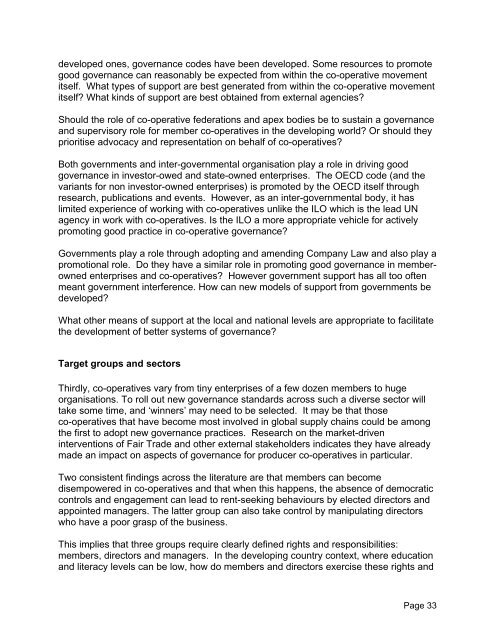
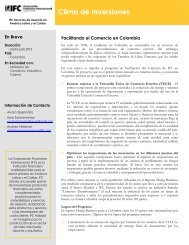
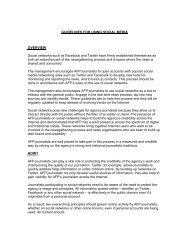
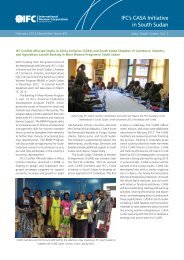
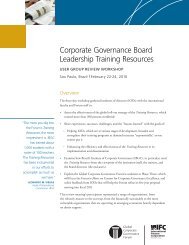

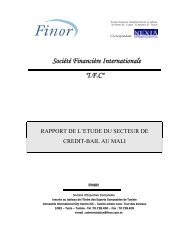


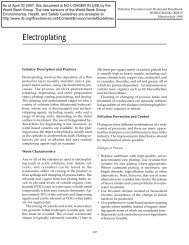

![Print a two-page fact sheet on this project [PDF] - IFC](https://img.yumpu.com/43449799/1/190x245/print-a-two-page-fact-sheet-on-this-project-pdf-ifc.jpg?quality=85)


